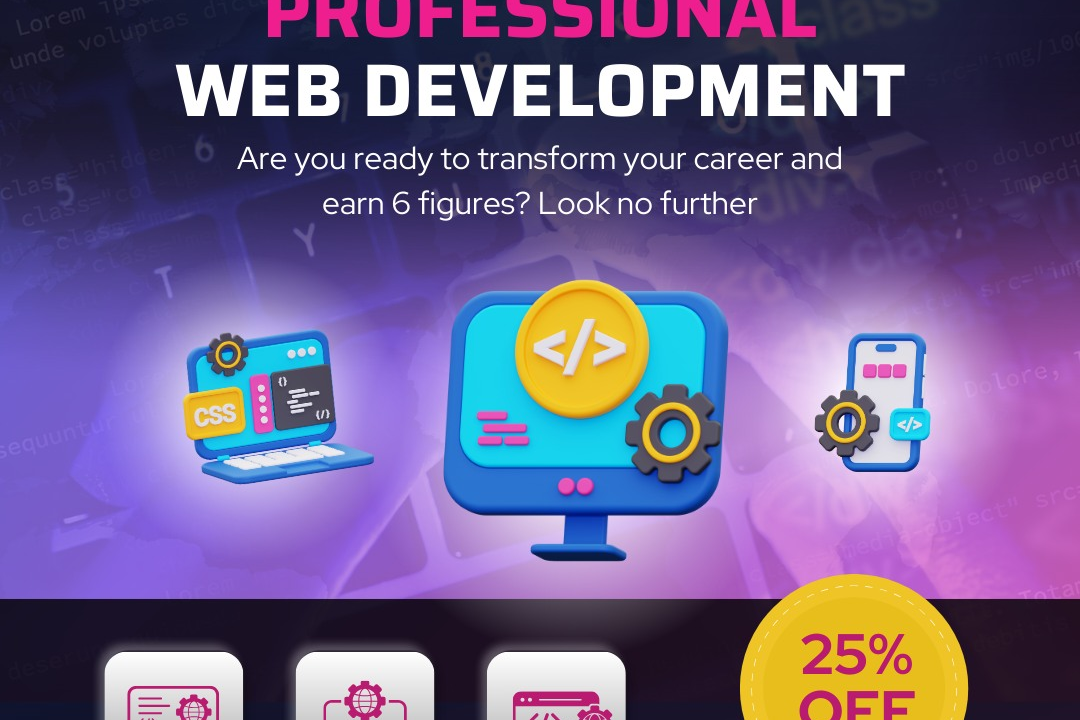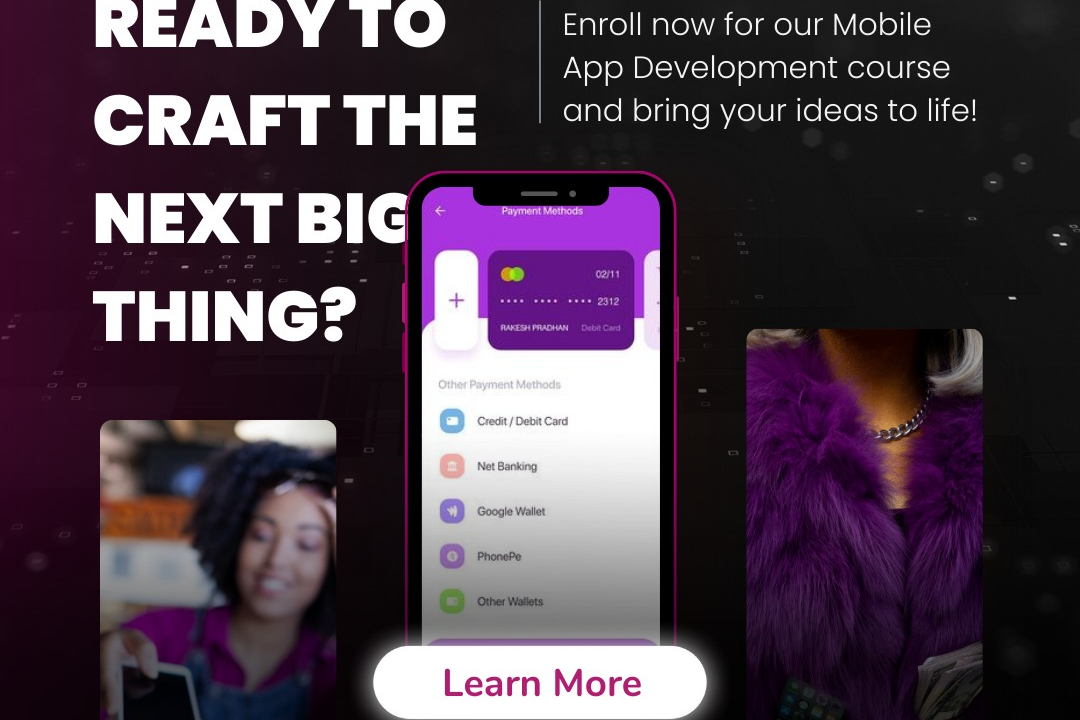Fectorial Program In Php Throw Class And Function
A factorial program in PHP using classes and functions is a structured way to calculate the product
Fectorial Program In Php Throw Class And Function
A factorial program in PHP using classes and functions provides a clear and reusable way to perform factorial calculations, which are fundamental in mathematical and computational problems such as permutations, combinations, and algorithms. By encapsulating the logic within a class and using functions, developers can easily maintain, extend, and integrate the code into larger projects. This structured approach promotes code reusability, modularity, and readability, making it easier to handle more complex calculations or adapt the program for different use cases in practical applications.
To Download Our Brochure: https://www.justacademy.co/download-brochure-for-free
Message us for more information: +91 9987184296
A factorial program in PHP using classes and functions provides a clear and reusable way to perform factorial calculations, which are fundamental in mathematical and computational problems such as permutations, combinations, and algorithms. By encapsulating the logic within a class and using functions, developers can easily maintain, extend, and integrate the code into larger projects. This structured approach promotes code reusability, modularity, and readability, making it easier to handle more complex calculations or adapt the program for different use cases in practical applications.
Course Overview
The “Factorial Program in PHP through Class and Function” course offers a concise, practical introduction to calculating factorials using PHP, showcasing how to implement this with object-oriented programming and functions for reusable, efficient code.
Course Description
Learn to compute factorials in PHP using classes and functions, combining object-oriented and functional programming for efficient, reusable code.
Key Features
1 - Comprehensive Tool Coverage: Provides hands-on training with a range of industry-standard testing tools, including Selenium, JIRA, LoadRunner, and TestRail.
2) Practical Exercises: Features real-world exercises and case studies to apply tools in various testing scenarios.
3) Interactive Learning: Includes interactive sessions with industry experts for personalized feedback and guidance.
4) Detailed Tutorials: Offers extensive tutorials and documentation on tool functionalities and best practices.
5) Advanced Techniques: Covers both fundamental and advanced techniques for using testing tools effectively.
6) Data Visualization: Integrates tools for visualizing test metrics and results, enhancing data interpretation and decision-making.
7) Tool Integration: Teaches how to integrate testing tools into the software development lifecycle for streamlined workflows.
8) Project-Based Learning: Focuses on project-based learning to build practical skills and create a portfolio of completed tasks.
9) Career Support: Provides resources and support for applying learned skills to real-world job scenarios, including resume building and interview preparation.
10) Up-to-Date Content: Ensures that course materials reflect the latest industry standards and tool updates.
Benefits of taking our course
Functional Tools
1 - PHP Programming Language
PHP (Hypertext Preprocessor) serves as the core tool for developing the factorial program, providing an open source scripting language tailored for web development. It offers a flexible environment to write, test, and run server side scripts efficiently. Students learn to harness PHP's syntax, data types, and built in functions to implement algorithms. PHP's integration capabilities with databases and web servers make it a practical choice for building dynamic applications involving mathematical computations like factorial calculations. The course emphasizes understanding PHP's core features to develop robust functions and classes to encapsulate logic and improve code reusability, enhancing learners' overall programming competence.
2) Integrated Development Environment (IDE)
An IDE such as PHPStorm, Visual Studio Code, or Sublime Text provides a comprehensive workspace for writing, debugging, and managing PHP code. These tools come equipped with features like syntax highlighting, code completion, and error detection, which help students write cleaner and more correct code. IDEs facilitate easier navigation through complex codebases, enable real time error tracking, and often include built in debugging tools, making them invaluable for developing and testing factorial programs with classes and functions. By using these environments, learners can efficiently learn best coding practices and develop confidence in managing large projects.
3) Object Oriented Programming (OOP) Concepts
The course introduces foundational OOP tools such as classes, objects, and methods to structure PHP code efficiently. These concepts help in organizing code logically, making it easier to understand, maintain, and extend. Students create a class to represent factorial operations, encapsulating properties and behaviors related to factorial calculations. The use of constructors, destructors, and access modifiers enhances code security and flexibility. This approach teaches learners how to translate mathematical logic into reusable code modules aligned with software engineering standards, setting a solid base for advanced development tasks.
4) Functions in PHP
Functions are essential tools used in the course to modularize code, improve readability, and facilitate code reuse across different parts of the program. Students learn how to define, invoke, and pass parameters to functions in PHP, which is critical when implementing the factorial algorithm. Functions help in isolating specific computational logic, making debugging and testing more straightforward. They also serve as building blocks for developing scalable and maintainable code, essential skills in real world programming projects. The course emphasizes writing efficient, clear, and well documented functions tailored for mathematical operations.
5) Real Time Project Environment
Working within a real time project setting allows students to practice integrating classes and functions in a practical context. They learn how to develop a complete factorial program, from conceptual design through coding, testing, and debugging. This environment simulates industry scenarios, emphasizing version control, collaborative coding, and iterative development. Using real time project tools enables learners to experience the entire lifecycle of software development, boosting their problem solving skills and confidence in deploying functional PHP applications that implement complex algorithms like factorial calculations.
6) Debugging and Testing Tools
Debugging tools and techniques are essential for validating the correctness of the factorial program. Students utilize built in PHP debugging tools or IDE specific debugging features like breakpoints and variable inspection to identify and rectify errors in their code. Testing frameworks such as PHPUnit may also be introduced for automated testing of functions and classes, ensuring reliability and robustness of the program. These tools help learners understand common pitfalls and improve their ability to write error free code, positioning them for better software quality management in professional environments.
7) Version Control Systems (Optional but Recommended)
Tools like Git are incorporated to manage version control of their codebase, allowing students to track changes, revert to previous versions, and collaborate efficiently. Understanding version control is crucial for managing different iterations of their factorial program, especially during debugging or enhancement phases. This fosters good software development habits and prepares students for collaborative workflows in real world projects.
8) Documentation and Code Commenting Tools
Proper documentation tools and commenting practices are emphasized to maintain clear and understandable code. Students learn to use comments effectively within their classes and functions, describing their purpose and logic. Well documented code simplifies future maintenance, peer review, and knowledge sharing, which are vital in professional software development settings. This practice ensures that their factorial program remains understandable and modifiable over time.
9) User Interface Design and Input Handling
Incorporating user interface elements, such as web forms or command line prompts, teaches students how to handle user input securely and efficiently. They learn to validate data, sanitize inputs, and provide clear feedback, ensuring the factorial program can interact smoothly with users. This skill is essential for developing user friendly applications that integrate PHP logic with front end interfaces, making the program more accessible and versatile.
10) Error Handling and Exception Management
The course covers robust error handling techniques including PHP’s try catch blocks and custom exception classes. Students learn to anticipate potential errors such as invalid inputs or computational overflows and handle them gracefully. This ensures their factorial program can manage unexpected scenarios without crashing, thereby enhancing reliability and user experience. Mastering exception management is a critical aspect of developing resilient software.
11 - Optimization Techniques for Computational Efficiency
Students explore ways to optimize their factorial program, such as using iterative instead of recursive methods to prevent stack overflow or implementing memoization for repeated calculations. These techniques improve execution speed and resource utilization, which are vital in handling large input values or integrating the factorial logic into larger applications. Learning optimization strategies prepares students for high performance programming challenges.
12) Deployment and Hosting
The course includes steps for deploying PHP applications to web servers or cloud platforms, allowing students to make their factorial programs accessible online. They learn to configure hosting environments, set permissions, and troubleshoot deployment issues. This experience broadens their skills beyond coding, encompassing the full lifecycle of web application deployment.
13) Security Best Practices
Students are introduced to security considerations such as input validation, preventing injection attacks, and securing environment configurations. Proper security practices ensure their PHP programs, including the factorial calculator, are safe from common vulnerabilities, which is essential in professional development.
14) Integration with Databases (Optional Advanced Content)
For more advanced learners, the course may explore storing calculation results or user data in databases like MySQL. This integration helps in building more complex applications where factorial computations are part of larger data driven systems, teaching students about data persistence and retrieval.
15) Learning Management and Feedback Tools
Utilizing platforms like version control repositories, continuous integration (CI) pipelines, or online code editors enhances collaborative learning. Students receive immediate feedback on their code quality, fostering a more interactive and engaging learning environment.
16) Certification and Portfolio Building
Students compile their projects, including the factorial program with classes and functions, into a portfolio that showcases their skills to potential employers. Certification from JustAcademy validates their expertise, increasing their job readiness and career prospects.
17) Soft Skills Development
Throughout the course, learners develop problem solving, analytical thinking, and logical reasoning skills. Collaborating on projects and debugging exercises enhances communication and teamwork abilities, preparing them for real world software development teams.
18) Continuing Education and Advanced Topics
Post course, students are encouraged to explore advanced PHP topics such as MVC frameworks, REST APIs, or integration with front end technologies. This continual learning approach helps them stay updated with industry trends and broadens their development capabilities.
Browse our course links : https://www.justacademy.co/all-courses
To Join our FREE DEMO Session:
This information is sourced from JustAcademy
Contact Info:
Roshan Chaturvedi
Message us on Whatsapp: +91 9987184296
Email id: info@justacademy.co
best crash reporting React Native
Hoe Add Fingerprint In Php Program












